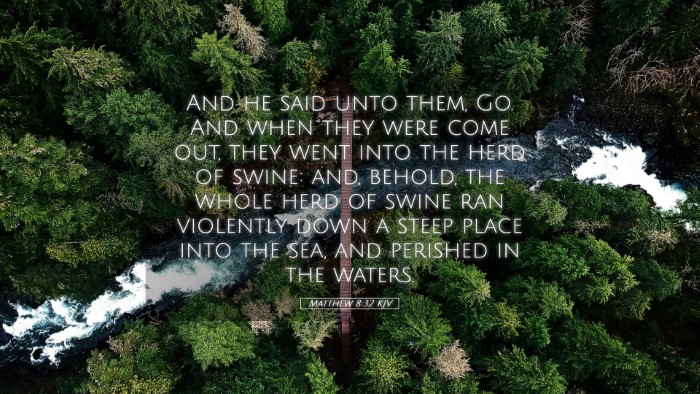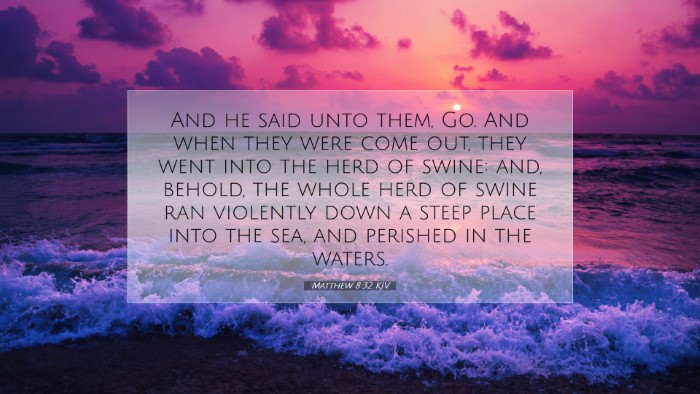Commentary on Matthew 8:32
Bible Verse: Matthew 8:32 - "And He said to them, 'Go!' So they went. And when they had come out, they went into the herd of swine. And suddenly the whole herd of swine ran violently down the steep place into the sea, and perished in the water."
Introduction
This powerful verse encapsulates a significant event in the ministry of Jesus where He demonstrates His authority over demons and nature. This commentary strives to synthesize insights from esteemed public domain scholars such as Matthew Henry, Albert Barnes, and Adam Clarke, tailored for the enrichment of pastors, students, theologians, and biblical scholars.
Contextual Background
The context of Matthew 8 includes a series of miraculous healings and exorcisms performed by Jesus. In this particular narrative, Jesus encounters two demon-possessed men in the region of Gadarenes (or Gerasenes). The significance of this passage lies not only in the liberation of these men but also in the reactions of those who witnessed the event.
The Authority of Christ
Matthew Henry highlights the authority of Jesus over the demonic forces at play. Henry notes that the command of Jesus to the demons reflects His divine power and sovereignty. The phrase "Go!" indicates that Jesus speaks with authority; He requires no lengthy incantation or ritual. This authority is foundational in establishing the identity of Christ as the Son of God.
The Nature of the Demons
Albert Barnes emphasizes the recognition the demons have of Jesus’ authority. They plead not to be tormented before the appointed time, showcasing their understanding of their fate. This awareness adds a layer of theological depth to the text, as it portrays the cosmic battle between good and evil—the demons recognize their impending doom through Christ's authority.
The Swine and Symbolism
The decision to enter the herd of swine raises questions discussed by Adam Clarke. The swine, considered unclean animals by Jewish law, symbolize the rejection of divine authority and law prevalent among the Gentiles in the region. This act serves as a stark contrast to Jewish purity laws, highlighting the cultural differences between Jesus’ ministry and the practices of the local populace.
The Impact of the Miracle
Upon their descent into the sea, the swine's destruction illustrates the devastating consequences of sin and demonic influence. Matthew Henry rightly points out that this event serves as a dramatic visual of the fate that awaits those who disregard God’s commands. It is not merely a spectacle; it carries significant moral and spiritual implications about the nature of evil.
The Response of the Townspeople
The subsequent reaction of the townspeople is noteworthy. As Barnas reflects, their response is one of fear rather than gratitude or awe. Instead of celebrating the liberation of the possessed men, they plead with Jesus to leave their region. This fear represents a rejection of the divine in favor of the comfort of the familiar. The destruction of the herd perhaps revealed a risk that the townsfolk were unwilling to embrace.
Theological Implications
This passage teaches significant theological truths, including the nature of Jesus’ authority over spiritual darkness and physical creation. Adam Clarke discusses the broader implications of Jesus’ ministry, noting that His miracles were not just acts of compassion; they revealed the character of God in confronting evil and restoring creation. The dual emphasis on Jesus’ power over demons and the natural world suggests a comprehensive dominion over all aspects of existence.
Conclusion
The account in Matthew 8:32 is a dynamic blend of narrative, theology, and practical implications. It challenges readers to consider their response to the authority of Christ in their own lives. As we reflect on this passage, we are called to acknowledge the divine sovereignty of Christ, the reality of spiritual warfare, and the cost of discipleship in a world that often resists the transformative power of the Gospel.


